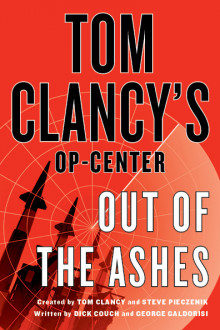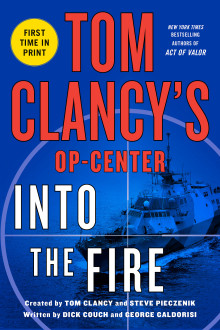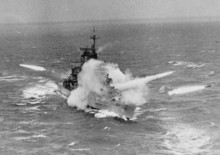Written by George GaldorisiPosted in Blog,National SecurityFebruary 25, 2015

At the heart of Global Trends 2030 are four megatrends that it identifies as the most significant trends that will affect the world looking out over a decade-and-a-half into the future. Previous editions of Global Trends have also identified megatrends, and if there is one part of GT2030 that is the most “mature” and well-developed, it is this mega-trends aspect of the report.
Trends mean just that; extrapolation of things happening today that, if left largely alone, will continue along the path they are on and result in a “tomorrow” that while not “predictable” represents a projection of a future state that is more likely than not. For this edition of Global Trends, four megatrends dominate the landscape. These four megatrends are:
- Individual Empowerment
- Diffusion of Power
- Demographic Patterns
- Food, Water, and Energy
Read more about these megatrends that dominate our world in my post on the Defense Media Network website:
Megatrends – What are They and What Do They Mean?
Written by George GaldorisiPosted in Blog,This WeekFebruary 23, 2015
The movie “The Imitation Game” credits mathematician Alan Turing with ending World War II two years early and saving 14 million lives. So it might seem strange to say it undersells Turing’s legacy. And yet that’s the case.
It’s true that as the movie depicts, Turing gave the Allies an incredible advantage by cracking the German Enigma code. This allowed England and her allies a degree of visibility into their enemy’s plans that present-day spies can only dream of. But a more comprehensive account of Turing’s work tells us something astonishing: Code-breaking was but a sidebar to Turing’s larger ambitions.
Like Newton and Einstein, Turing strove to understand something fundamental about reality itself. And as the inventor of the mathematical abstraction that enabled all subsequent devices we call “computers,” some of his insights are more relevant today than ever.
At the time, a “computer” was literally a person, working with pencil and paper or perhaps a mechanical calculator as an aid. Mathematicians were interested in whether or not this hypothetical computer-person could, starting from a set of axioms, determine whether any statement in the universe was true or false.
Building on the work of others, Turing realized that the way to answer this question was to replace the human with a “universal” mechanical computer. Turing didn’t need to build such a computer; it was enough to describe it mathematically, which he did.
Read more about how all this started here:
http://www.wsj.com/articles/why-we-neednt-fear-the-machines-1417394021?KEYWORDS=Christopher+Mims
Written by George GaldorisiPosted in Blog,Writing TipsFebruary 22, 2015

Ann Tyler is one of today’s most frequently read and endearing writers. Her followers are legion. She shares her writing secrets as well as what she reads and especially what happens when she reads her own books in a recent piece in the New York Times. Among her words of wisdom:
Who I am today is all because of a picture book that was given me on my fourth birthday: Virginia Lee Burton’s “The Little House.” I remember the first time my mother read it to me — how its message about the irreversible passage of time instantly hit home. From then on, I seem to have had a constant awareness of the fact that nothing lasts forever, and that someday I would miss what I was now taking for granted. That’s a valuable insight to go through life with.
Read more about Ann Tyler’s secrets here:
http://www.nytimes.com/2015/02/08/books/review/anne-tyler-by-the-book.html?_r=0
Written by George GaldorisiPosted in Blog,Book NewsFebruary 20, 2015

Tom Clancy’s complex, adrenaline-fueled military novels spawned a new genre of thrillers and made him one of the world’s best-known and best-selling authors. When Clancy died in October of last year, one of the most celebrated authors of our generation no longer walked among us.
Many people had – and continue to have – diverse options about Tom Clancy. However, most agree, above all else, he was prescient about the future of geopolitics, intelligence, military operations and emerging technology and weaponry. In his own words:
I hang my hat on getting as many things right as I can. I’ve made up stuff that’s turned out to be real — that’s the spooky part.
Tom Clancy also left a gift for aspiring writers with words that are as important today as when he said them years ago He said none of his success came easily, and he would remind aspiring writers of that when he spoke to them:
I tell them you learn to write the same way you learn to play golf. You do it, and keep doing it until you get it right. A lot of people think something mystical happens to you, that maybe the muse kisses you on the ear. But writing isn’t divinely inspired — it’s hard work.
Read more here:
What Made Tom Clancy So Unique?
Written by George GaldorisiPosted in Blog,National SecurityFebruary 18, 2015

Tom Clancy, the most well-known military writer in a generation was universally hailed as being prescient about regarding the future of intelligence, technology and military operations in his books seemed to come to pass five, ten, or more years later.
Not all of us are so prescient about what our future world will look like. But there is a source – and an open source – available to all of us that looks deep into the future in the areas of international affairs, i.e. what our world will look like in the ensuing decades, technology and military operations.
While many organizations – inside and outside of government – of necessity look to the future to attempt to discern what the future security environment portends, the National Intelligence Council represents the “Pros from Dover,” in this regard. The NIC supports the director of national intelligence in his role as head of the intelligence community (IC) and is the IC’s focal point and governing organization for long-term strategic analysis.
Among the projections in its groundbreaking report, Global Trends 2030: Alternative Worlds:
- China’s economy is set to overtake that of the United States in the 2020s, but China will not challenge the United States’ preeminence or the international order;
- Asia will become more powerful than both North America and Europe combined (based on population, GDP, military spending, and technological investment);
- The United States will achieve energy independence with shale gas, and;
- Wider access to disruptive technologies – including precision-strike capabilities, cyber instruments, and bio-terror weaponry – could increase the risk of large-scale violence and disruption.
Read more about what the future will hold in my post on the Defense Media Network website here:
You don’t have to be as prescient as the late Tom Clancy to know what the future will hold.
Written by George GaldorisiPosted in Books,Into The FireFebruary 18, 2015

Tensions flare in Northwest Asia and Op-Center races to prevent World War III in this chilling, ripped-from-the-headlines thriller from the authors of the USA Today and Publisher’s Weekly bestseller Out of the Ashes.
Published Praise for Into the Fire
When a team of assassins murder a high-ranking North Korean general and his family in their sleep, making it look like a robbery, events are set in motion that could shake the balance of world power. Meanwhile, a U.S. Navy combat ship, the USS Milwaukee, is attacked by North Korean forces in the middle of a training exercise off the shore of South Korea, and Commander Kate Bigelow is forced to ground the ship to avoid being captured. The crew takes refuge on a tiny island, trapped dangerously between the grounded ship and a fleet of hostile North Korean soldiers.
Op-Center intelligence discovers a secret alliance behind the attack—a pact between China and North Korea that guarantees North Korea total control of a vast oil reserve found beneath the Yellow Sea. As both sides marshal their forces for a major confrontation at sea, Chase Williams and his Op-Center organization devise a plan to secretly spirit the American crew from the island and out from under North Korean control. But the North Koreans are not finished. In a desperate gamble, they unleash a terrorist cell on the American homeland. Only Op-Center can uncover their plan and stop it in time to prevent a major catastrophe that could lead to all-out war.
Buy Into the Fire Online Now
Barnes and Noble
Amazon
iTunes
IndieBound
Written by George GaldorisiPosted in Blog,This WeekFebruary 16, 2015

It is so easy to arrive home from work in a bad mood, cranky and frustrated.
Shaking off the after-work blues can be hard, especially when we are tired. The human stress response is a chemical chain reaction of hormones coursing through one’s system, says Jordan Friedman, a New York City stress-management trainer and author. Add fatigue, “and it’s like dousing those chemicals with lighter fluid.”
It helps to think about the transition from work to home in three stages: leaving the office, getting home and walking through the door.
Best advice: “Don’t be too quick to try to get rid of the bad mood right away. Pay attention to what your feelings might be trying to tell you.”
Read more here:
http://www.wsj.com/articles/rethink-your-after-work-routine-to-make-the-transition-home-a-happy-one-1423611601?KEYWORDS=sue+shellenbarger
Written by George GaldorisiPosted in Blog,Writing TipsFebruary 15, 2015

It is an understatement to say the publishing world has been in turmoil for the last decade – and especially for the last five years. Publishers have merged, entire book chains have folded, e-books are surging in popularity and “self-publishing,” once second-tier at best is now a legitimate route to success.
But the churn should make all writers extremely wary, even when they grab the supposed gold ring of signing with an established publisher. Atticus Lish is the poster child for this.
Atticus Lish’s Preparation for the Next Life got the kind of reception that first-time novelists only dream about. The gritty debut novel, set in the violent, dangerous margins of New York City, was one of 2014’s genuine literary sensations, earning ecstatic reviews and landing on many top-10 lists. One critic called the novel, “a tour de force of urban naturalism” and “a love story that’s as bold and urgent as any you’ll read this year.” But in a stark illustration that fiction writing often doesn’t pay, Mr. Lish has so far made only $2,000 for his novel, which took five years to write.
Read more here
Written by George GaldorisiPosted in Blog,Book NewsFebruary 13, 2015

Last year saw two “reboots” the Tom Clancy Op-Center series and another movie starring Jack Ryan – the fifth movie with “America’s Action Hero.” Both were hits.
There are compelling reasons why this is so. With threats from emerging superpowers, rogue nations and, increasingly, terrorists of all stripes, Americans want to know who will protect them.
Increasingly it is our nation’s special operators. That is why the international action-arm of our re-booted Op-Center series is the Joint Special Operations Command (JSOC). Comprising the most capable special operators from all the U.S. military services, they are the ones most frequently “on that wall” protecting us.
Read more here how “life imitates art”
Written by George GaldorisiPosted in Blog,National SecurityFebruary 11, 2015

The most compelling threat to the United States today is the treat of missile attack. Nations like China and Russia who harbor enmity towards the United States have massive numbers of intercontinental ballistic missiles armed with weapons of mass destruction. It is an existential threat to all of us.
And increasingly, rogue nations such as North Korea and Iran are acquiring the means to deliver intercontinental ballistic missiles armed with WMD.
But this is not a new threat! And the United States Navy has been working on missile defense for generations. Today the Navy is in the lead to prevent missile attacks on the United States or on our interests. It has been a long journey and understanding how we got here will also help understand where we are going in the future.
For anyone younger than those of the baby boomer generation, it is impossible to fully understand the urgency the Cold War brought to building and deploying the U.S. Navy’s missile fleet. Once the Berlin Wall went up and the spectre of the Soviet Empire crushing the West – and especially the United States – began to sink in during the early 1950s, spending on defense became a compelling urgency. Few can forget the phrase famously attributed to Soviet premier Nikita Khrushchev while addressing Western ambassadors at a reception at the Polish embassy in Moscow on Nov. 18, 1956, “We will bury you!”
Read more about the future in my post on the Defense Media Network website here








